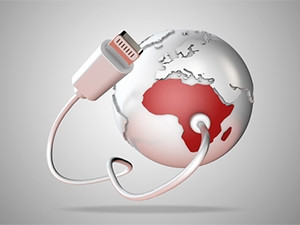
MTN has made a "minimal" financial commitment to the planned new Africa-1 submarine cable system, it says. This as Telkom remains tight-lipped on its planned investment in the project.
The South African telcos have been linked to the Africa-1 project through a memorandum of understanding (MOU) signed by both - along with three other international operators - indicating an intention to participate in the construction of the new cable.
"As with most initiatives of this scale, all investors are required to make minimal financial commitments at this stage (MOU) of the project," ITWeb learned from John Unterhorst, group executive for global carrier services and group network/IP projects at MTN Group.
MTN and Telkom have been coy to confirm how much they would likely put up for the project if it goes ahead, providing no set financial commitments.
"The Africa-1 Group has been conducting preliminary talks with industry players to establish interest in a new undersea cable along the east coast. Telkom has participated in these talks but has not committed to any investment in the initiative," Telkom's managing executive of group communication, Jacqui O'Sullivan, told ITWeb.
Hong Kong-based PCCW Global announced earlier this week that it - along with Saudi Telecom Company, Telecom Egypt and the two South African operators - had signed an MOU with the intention of constructing Africa-1.
"This consortium-funded system will connect Africa with the Middle East and South Central Asia and provide onward connectivity to Europe," the statement reads.
Unknown price tag
The original announcement gave no indication of how much the project is likely to cost, or how much each telecoms player is expected to invest. Ovum senior analyst Richard Hurst says a likely cost could be taken from current known benchmarks for similar submarine cable projects such as Seacom and Eassy.
"Seacom was described as a $650 million project, thus we can expect a similar price tag for Africa-1. However, new technologies, cable laying systems, and the mix of equity and debt finance will dictate the level of commitment from the operators/investors."
Hurst says we can assume some capital will be required from MTN and Telkom for participation but perhaps the finer details may still need to be worked out.
"Telkom could be discussing what level of participation it is wanting to engage in the project, which will have an effect on the level and commitment of investment required, thus implying they have not committed funds as yet, but we can assume there will be some form of financial participation," he adds.
"As a proudly African telecoms operator, MTN continues to invest in initiatives which aim to further close the digital divide in our markets. The Africa-1 initiative provides another opportunity to ensure long-term capacity supply, beyond the design capacity limit of some of our current investments," is all Unterhorst would say on the matter.
O'Sullivan similarly said Telkom is always looking for ways to best collaborate within the industry, but that any such collaboration "would have to be in a manner that added value to the business".
Hurst says the Africa-1 cable system could help with demand for bandwidth in Africa, which is increasing as more advanced services such as video, cloud, etc, make their way into the consumer and enterprise markets.
"I think everyone will be hoping for a drop in prices but perhaps more importantly will be a massive increase in the quality of service," he adds.
Africa Analysis MD Dobek Pater agrees another undersea cable could lead to lower pricing of retail data and broadband-based services.
"Investment in the Africa-1 cable will allow investors to decrease their cost of international bandwidth provision due to the fact that the new cable offers a lower cost per unit of international capacity. The lower unit cost to the operators means they can continue competing on price," adds Pater.
Sharing in Africa-1
"Companies named in the MOU represent a wealth of experience and expertise in deploying major cable systems, and they are expected to be joined in the consortium by other carriers seeking to contribute to and to share in Africa-1's success," according to PCCW Global.
Neither Vodacom nor Cell C responded by the time of publication to queries from ITWeb as to whether they had been approached to join the consortium.
The Hong Kong company's statement indicated a construction and maintenance agreement for the project is expected to be signed by June, with a target for services to begin operating in the third quarter of 2017.
Africa-1 will have at least a three-fibre pair core that extends more than 12 000km along Africa's east coast towards Saudi Arabia, Egypt and Pakistan, with up to an additional 5 000km for branches. The system will use the latest 100G technology and will be initially equipped to accommodate several terabits of capacity from day one. It will also offer interconnection with other cable systems and open access at all cable landing points.
Share